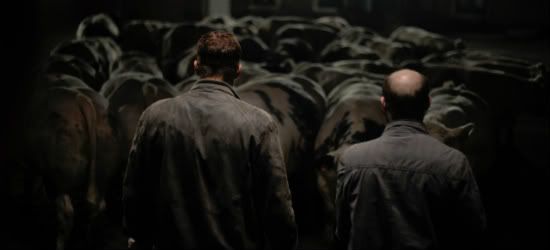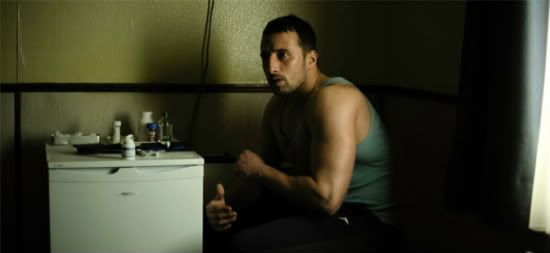
“No matter what you do or think, one thing is for sure, you’re always fucked. Now, tomorrow, next week or next year, until the end of time, fucked.”
The opening voiceover in “Bullhead,” from Belgian director Michael R. Roskam, expresses, in no uncertain terms, a deeply pessimistic view of the world. It’s a bold move by Roskam, in his debut feature film, and works twofold: it properly orients the viewer into the film’s universe and subject matter, the illegal trade in growth-hormone-laced beef in Belgium; and it bluntly contextualizes the mindset of our protagonist, Jacky (Matthias Schoenaerts). Is this bleak outlook justified?
A resounding yes. “Bullhead” works because, similar to some other strong films that made the festival rounds in 2011 – the excellent “Miss Bala” and “Policeman” – it never descends into didactic grandstanding, instead opting for a more subtle, nuanced approach that respects the intelligence of its audience. Don’t expect to learn too much about this seedy trade (and, honestly, why would you, that’s better suited for a documentary anyway), but if you view the film as a character study first and foremost, you’ll be rewarded with a gripping, assuredly constructed piece of melodrama that also dabbles in the ever ubiquitous world of the crime genre.

Actually, come to think of it, melodrama is the wrong word, for it connotes a sensationalized dramatic outline predicated on the notion that the laws of cause and effect do not matter, or at least go unexamined, in the interest of plot and exaggerated emotions over characterization. Whatever generic label you want to throw at “Bullhead,” it’s impossible to say it sacrifices character development for plot and theatricality, or that anything we’re shown in the film is superfluous. On the contrary. Every detail, flashback, character connection and family history matters here. In fact, you could argue that Roskam, who also wrote the script, almost goes too far in connecting all the dots, not unlike the best show currently on television, “Breaking Bad.” So thorough and insistent is he on proving the worth of each scene, and how they all matter later on in the story, that you may find the film to be a bit tiresome and overly-reliant on coincidence.
You will not hear that argument at The Playlist, though. This is a film especially for an audience that hates waste; people who want every minute to count, for each scene to mean something, and add to the bigger picture. Schoenaerts gives the kind of performance that makes stars out of other, more fortunate actors. His portrayal of Jacky, a hulking mass of steroidal tension, is revelatory. We were sure we had this guy figured out from the beginning. He’s just another jock toughie who’s used his size and strength to reach a level of success in this criminal milieu, right? Wrong. As each scene comes and goes, another layer is stripped away from Jacky, revealing a deep sadness and tragedy to the character that was always there in his eyes, but protected by pure machismo. Hopefully other smart, film-savvy directors out there discover “Bullhead” and give this guy more work, because Schoenaerts nearly reaches a Tom Hardy-in-“Bronson”-level of magnificence, even though the two films are very different. 
Jacky injects and swallows a medicine cabinet worth of “supplements” into his body every day, a routine that usually ends with him standing naked in his room flexing and punching at the air. He’s trying to prove his worth to himself. In this world, your value is measured by your manhood, and well, Jacky has a lot of issues in that department. When the film suddenly flashes back 20 years, the big piece of this character’s puzzle is exposed, and gracefully explains so much of his behavior and actions up to that point. Movies are often far too reductive when they purport the clichéd one big moment in a character’s history that defines them for the rest of their life. Again, not so in the case of “Bullhead.” It’s interesting to think how different, and frustratingly opaque, this film would be without any of the flashbacks. Mostly, it’s that the one big moment in this film would, in fact, absolutely define a man for the rest of his life, and irrevocably change him forever.
If Rob Zombie proved with his unnecessary “Halloween” remake that giving the back story and reasons for the creation of a “bad guy” takes the piss out of what makes Michael Myers scary, then Roskam has successfully countered that argument with “Bullhead.” Do not mistake this comparison. We’re not saying Jacky is the next slasher villain ready for his own franchise and a doll adorned on every Hot Topic shelf across the country. It’s more that we love being proven wrong, believe it or not. There are no “rules” to cinema in the end. It’s ok to feel bad for this guy. It wasn’t his fault. This is evidence that giving us the how and why for the creation of a sociopath can actually strengthen a film. In “Bullhead,” having sympathy for the devil is justified. [B+]
